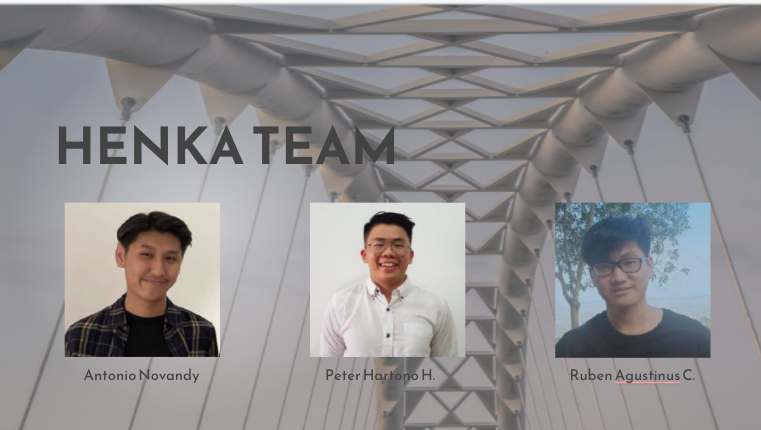The Henka Team, Faculty of Engineering, Universitas Indonesia (FTUI) won First Place in the Bridge Design Competition at Nanyang Technology University (NTU), Singapore, after eliminating 94 other teams from Singapore, Indonesia, Malaysia, Vietnam, Egypt, India , and the host from Nanyang Technology University (NTU), Singapore. The Henka team consisted of three students of the Civil Engineering Department class 2019, namely Peter Hartono Halim, Ruben Agustinus Chesin, and Antonio Novandy.
The NTU Bridge Design Competition is a bridge design competition based on a case study determined by the committee. The assessment component considers bridge design, effective construction methods, minimizing environmental damage, construction management, and understanding the conditions of the work area so that the construction process and the bridge do not interfere with the comfort of the surroundings. During 28 February 2022-2 April 2022, the Henka Team went through three stages of competition, namely the preliminary round, final round, and final presentation.
“The case study faced by the FTUI Henka Team is designing a bridge at Choa Chu Kang North 6 and Woodlands Road. This location has its own difficulties where the land contour of the area is not uniform and there are pedestrian paths and drainage that should not be damaged. In addition, another difficulty factor is the existing condition of the buildings around the construction site, so it is necessary to consider construction methods that do not interfere with these buildings,” said Peter, Henka Team Leader.
They devised appropriate designs and methods to meet the construction challenges of the site. The bridge designed has a length of 224,775 m with a Spiral-Circle-Spiral (SCS) curve with a radius of 95 m. Later, the bridge will consist of road connections, one beam bridge, and a single multi-span bridge. The two lanes of the bridge walkway will have a width of 3.5 m each and a width of 1.8 m on both sides for pedestrian paths.
“Our bridge design prioritizes the green factor or environmental factors of construction. Our team takes advantage of several bridge construction innovations that are quite environmentally friendly. In addition, we excel in terms of construction management details. Every step, the heavy equipment used, to the mobilization carried out, we plan carefully and in detail. This gives us more value in the eyes of the jury,” said Ruben.
“There are two Henkavation, or Henka innovations that we highlight in the bridge design. First, we use type E additives. This material is a reducing and accelerating water admixture that is useful for increasing the strength of concrete due to water reduction and also shortening the setting time of concrete due to the accelerated hydration process. In addition, we also take advantage of fly ash innovation as a cement substitute. Fly ash is a solid waste produced from burning coal in power plants. Fly ash material is more environmentally friendly and can also increase the strength of concrete,” said Antonio.
Fly ash and type E admixture used by the Henka Team are components/products that have been used frequently. Quite a lot of research on these materials and their relationship to concrete. Based on these research results, the Henka Team decided to use fly ash and type E admixture as one of the added values for concrete as one of the advantages of their bridge design with the use of added materials which are expected to improve the quality and workability of the concrete.
For the achievements of students through this competition, the Dean of FTUI Prof. Dr. Heri Hermansyah, ST., M.Eng., IPU said, “This achievement proves that FTUI students are capable and can compete at the international level. These three FTUI students bring pride to the nation and state, because they are able to compete in international arenas, on a par with other nations.” He hopes that the innovation and design of student bridges will be implemented in various development projects that are currently being intensively implemented by the government and private industry in various parts of the country. “Technology and problem solving by the nation’s children need to get full attention and support from all parties so that they can continue to be developed in order to provide benefits for the community, nation and state,” said Prof. Heri.
***
Public Communication Bureau
Faculty of Engineering, Universitas Indonesia

